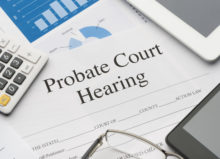What Is Probate Administration?

Probate administration is the court-supervised process of identifying, managing, and ultimately distributing your probate assets following your death. This article highlights some of the issues addressed in probate.
First, probate administration is generally required only if a decedent left assets subject to probate. Probate assets include real property and personal property owned by a decedent in the decedent’s name. This excludes assets held in trust, assets held jointly with others with rights of survivorship, most life insurance and IRA account proceeds, and certain other types of assets.
For example, if a decedent owned a $10,000 CD in his name at the time of his death, that CD would be subject to probate. On the other hand, if the same person owned the same $10,000 CD at the time of his death, but the CD was titled jointly with the person’s spouse, the CD would not be subject to probate.
Second, probate administration is a court-supervised process. That means a judge is involved, but the judge only oversees the process. The judge does not conduct the process. In most cases, Lawyers are also involved (and may even be required by Florida law!). Many documents are filed in the probate estate during the administration of the estate. Knowing which documents are required and how they are to be completed is the role of the lawyer.
Third, the Personal Representative must take control of the assets of the estate. This means protecting and maintaining assets until they are sold or distributed to the beneficiaries. Difficulties arise when assets of the estate are in the custody of an estate beneficiary or a third party. (A good reason to have a lawyer help.)
Fourth, the Personal Representative must identify and provide information to the beneficiaries of the estate. Sometimes this is easy and sometimes it is not. When disagreements arise among the beneficiaries, the Personal Representative can be caught in the middle, which is another good reason to have a lawyer help.
Fifth, creditors are entitled by Florida law to file claims in the estate. In order to notify creditors that someone has died, the Personal Representative is required to give notice of the death. Some creditors get personal notice, while others are reached by a newspaper ad. The estate cannot close (and should not distribute assets) until the creditor periods have closed. Similarly, a surviving spouse has special rights that must be enforced.
Sixth, after priority expenses and creditor claims are satisfied, the Personal Representative distributes the assets of the estate to the beneficiaries. If the only assets are cash, this is a simple process of sending out checks. If the assets include investment accounts, real property, or tangible assets (such as cars, furniture, jewelry, and similar items), the process is more complicated. As in other aspects of probate administration, the Personal Representative benefits from the help of a lawyer to protect the Personal Representative.
Seventh, probate administration takes time. The typical ‘formal’ administration generally requires around six months, or much longer if litigation, tax, or other complexities arise. Florida law does offer a quicker ‘summary’ administration for smaller estates, or estates involving a decedent who died more than two years earlier.
Finally, probate administration can be expensive. The estate may be required to pay the Personal Representative (executor), the lawyer for the Personal Representative, court costs, a bond for the Personal Representative, and additional costs for notices, certified mail, and other costs. There is no set fee to be paid to the Personal Representative or the lawyers, although Florida law does presume that a fee equal to 3% of the value of the assets in the estate is reasonable (that’s 3% to the Personal Representative and an additional 3% to the lawyer). Additional fees are possible depending on the difficulties encountered in administering the estate, creditor problems, whether the estate includes a business, and other issues.
The foregoing summary does not include all of the details involved in any estate, nor the range of issues that may arise in an estate. Probate administration can be a complicated and expensive process, which is a primary reason why people seek to avoid probate administration through estate planning.










